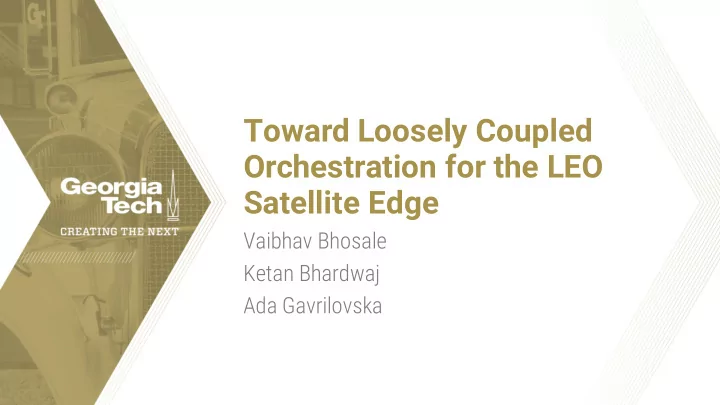

Toward Loosely Coupled Orchestration for the LEO Satellite Edge Vaibhav Bhosale Ketan Bhardwaj Ada Gavrilovska
LEO Satellites Image Credits: Space.com, Cnet.com, SpaceX 2
Why LEO Satellite Edge? • Intuitive edge advantages over bent-pipe The LEO Edge • Bent-pipe incurs two RTTs for each request • Easily be extended to many current satellite applications • LEO edge can help with economic feasibility and broaden the use 3 Image Credits:Abdel ‐ Rahman, Mohammad & Krunz, Marwan & Erwin, Richard. (2012). Out-of -band sensing scheme f or dy namic f requency hopping in satellite communications. 10.1109/ICC.2012.6363682.
Need for a New Orchestration Stack for LEO Edge • Most of the currently commissioned satellites serve a single mission • Availability of the LEO Satellites is tied to its economic feasibility • Support on-demand, multi-tenant workloads at LEO Edge • Dynamic configuration & deployment at LEO Edge • Same usage model & inter-operation as terrestrial edge 4
Current LEO Satellite Ecosystem 5
Current LEO Satellite Ecosystem 6
Design Goals of a LEO Edge Orchestrator • Incorporating mobility of the LEO edge 7
Using the terrestrial orchestration stack 8
Using the terrestrial orchestration stack 9
Just-in-time Orchestration 10
Design Goals of a LEO Edge Orchestrator ✓ Incorporating mobility of the LEO edge • Leveraging periodicity in LEO edge mobility 11
Sub-optimal handoffs 12
Design Goals of a LEO Edge Orchestrator ✓ Incorporating mobility of the LEO edge ✓ Leveraging periodicity in LEO edge mobility • Compensating for error in mobility prediction of LEO satellites 13
Actual position Predicted position 14
Just-ahead-of- time orchestration 15
Design Goals of a LEO Edge Orchestrator ✓ Incorporating mobility of the LEO edge ✓ Leveraging periodicity in LEO edge mobility ✓ Compensating for error in mobility prediction of LEO satellites ✓ Compensating app initialization overhead in terrestrial orchestration 16
Unique LEO Edge Orchestration Challenges • Mobility of the LEO edge • Inaccurate position prediction Further amplified due to the tight coupling between existing orchestrators & the underlying infrastructure Holds true for any other non-stationary edge infrastructure as well 17
Krios: Loosely Coupled Orchestrator for LEO Edge Key Idea: Make orchestration decisions "just ahead of time" Thus, loosen coupling b/w orchestration & LEO infrastructure using • Path projection models, cluster affinity chains and temporal compensation 18
Preliminary Evaluation Experimental Setup: Emulated LEO edge • SGP4 path model used • Evaluation Goal: How does loose coupling help in LEO edge? Impact on expected downtime (availability) • • Benefits of state handling and state transfer Two kinds of workloads at LEO edge Stateless: Nginx service • • Stateful: Full Wikipedia web cache 19
Downtime during Application Handoff • Krios can completely eliminate downtime 85% 18% • Works with no changes to Kubernetes 10% • Developers use it for LEO Edge as well 0% Other results showing benefit for 20 stateful edge functions in the paper
A clear signal for "new research" for & at LEO Edge Next Steps: Comprehensive evaluation & extension of current Krios for larger constellations with high fidelity experimental setup ➢ Need help / Want collaboration ➢ Actual details / access to LEO satellite(s): hardware, software, platforms ➢ Details / access to ground stations for experiments & testing 21
THANK YOU For any follow-up questions, you can reach us at: vbhosale6@gatech.edu ketanbj@gatech.edu ada@cc.gatech.edu
Recommend
More recommend